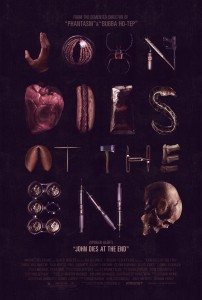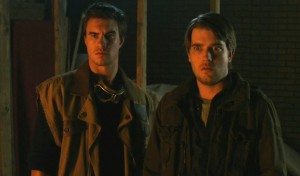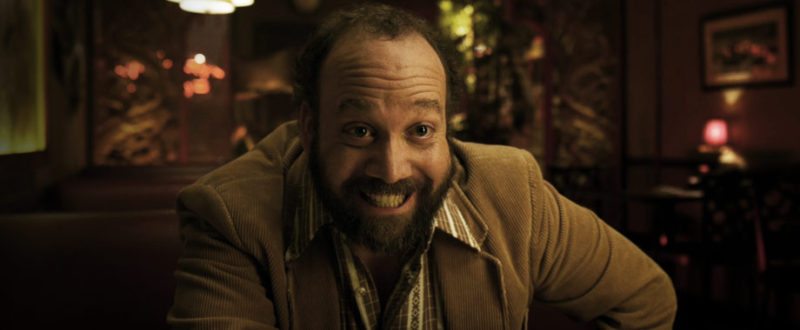 Right now there is a completely avoidable tragedy afflicting untold millions of Americans. They do not have the chance to see Don Coscarelli’s John Dies at the End in a proper cinema.
Right now there is a completely avoidable tragedy afflicting untold millions of Americans. They do not have the chance to see Don Coscarelli’s John Dies at the End in a proper cinema.
Hearing this dreadful news makes now an appropriate time to rend your clothes and thrash about, particularly if you are attractively built. Or if your clothes are on fire. Or both.
I’ve been singing the praises of John Dies since we caught it at the San Francisco International Film Festival months ago. This week, it’s playing in San Francisco and Berkeley. It’s also playing in select cities around the country over the next few weeks (check your local access here). I highly recommend a trip to see it. This is exactly the sort of film you are needed to support so there can be more films like this to need your support.
I just paid to see it again. This second viewing only more firmly established its awesomeness.
 It is difficult to describe exactly what makes John Dies at the End so successful. The story is anything but simple. Two young roustabouts are chosen by a mysterious pan-dimensional living pharmaceutical known as Soy Sauce. Under its influence, they are no longer bound by such trivialities as time, space, or sensibility. Penis-shaped doorknobs remain tricky to negotiate, however.
It is difficult to describe exactly what makes John Dies at the End so successful. The story is anything but simple. Two young roustabouts are chosen by a mysterious pan-dimensional living pharmaceutical known as Soy Sauce. Under its influence, they are no longer bound by such trivialities as time, space, or sensibility. Penis-shaped doorknobs remain tricky to negotiate, however.
There is a story. It makes as much sense as it needs to when it needs to. Even when it doesn’t need to, it stays busy grabbing you by the lapels and shaking your skull loose, just like that time you experimented with an electrified bong in college.
Pretty much every sequence one-ups the previous one in terms of sheer bizarreness. The cast—mostly new discoveries plus well-loved character actors—turn themselves inside out to wring every last drop of gusto from their emotive glands. Whether they’re displaying terror or insouciance or supremely stoned confusion, that comes across in spades. Spades driven forcefully into and through your neck.
Chase Williamson, as David Wong, is particularly due praise. You’ll also watch this film and remember why you used to love Paul Giamatti. His parking lot freakout scene puts him up there with Shelly Duvall losing it in the bathroom. Well, that may be hyperbole, but he’s good. And then you’ll recognize and dig the underrated Clancy Brown as Dr. Marconi and Glynn Turman from The Wire, and Doug Jones and Angus Scrimm, too.
On second viewing, John Dies at the End wasn’t quite as full of head-exploding surprise. It was, however, much more apparent how in control Coscerelli was despite the lack of big budget support. Effects get rubbery and the CGI looks a bit-SyFy, but there’s nothing wrong with way scenes are assembled in overlapping shots of variable focus and depth. You feel as fucked up as Dave and John just sitting in your seat.
And humor. For those of you squirming in your skivvies for the new version of Evil Dead, I’ve got a heads-up. That’s not going to be funny. You expecting it to be funny? That’s funny. If you want some laughs wrapped around a core of diabolically creepy otherworldly weirdness, what you want is John Dies at the End.
That’s right. I just compared this film to Evil Dead II and that comparison is fair. John and Dave don’t get as hard-core gory as Ash, but they’re not out on any picnic with Mouseketeers. John Dies at the End is chocko with decapitations, giant spider things, a meat monster, toothy chest-slugs, and some sort of prescient hot-pot squid stew that’s going to take over our reality.
Unless John and Dave stop screwing around with being dead and whoop some ass.
Let’s hope there’s a sequel.




I’ve been thinking about this movie a lot since I saw it, particularly about how it worked despite the fact there were a fair number of pieces that didn’t make much sense. Looper also didn’t make much sense and it wasn’t a very enjoyable film largely because of the massive plot holes. And yet John Dies is thoroughly enjoyable in spite of the nonsensical – how is that possible?
I think that at least part of the answer lies in the fact that the two main characters also have no idea what’s going on and so viewing events through their eyes means that we don’t have to understand what’s going on either. In this way, it’s like a really good SciFi book (think: Roadside Picnic by Arkady and Boris Strugatsky) that throws you into another world or time with limited explanation. This contrasts with books/films that go out of their way to explain the inner workings of plasmadotronhyperdrive (<– totally a thing) rather than just putting you on the flarfallepull using plasmadotronhyperdrive and letting you enjoy the ride. I far prefer the latter, though it can be harder to pull off because humans tend to want to explain everything (or maybe that's just me and my fellow scientists…). My hypothesis is that part of what makes John Dies so successful is that the lack of explanation works because the characters were just as confused as me.
And all of this makes me wonder if it’s more enjoyable to be confused in a film than to have things explained to the nth degree. Thoughts?
You’re definitely on to something regarding the characters being themselves totally confused. Because they’re confused, we too can be confused, and that’s okay.
The reason they can be confused is because the movie is set up for explanations not to matter. They deal with what comes at them, with little time for reflection. And we get to experience that with them. It doesn’t matter that in thinking about the movie later it doesn’t seem to make much logical sense. We were only ever told what the characters knew, and they didn’t know what the fuck was going on.
In Looper, the way time travel worked was a fundamental part of the story. It had to be explained for the story to be told. This is a dangerous way to go, because it opens you up to logical holes, which in Looper were many and gaping. The more a movie explains its impossible science, the more opportunity we have to say, wait a minute, that makes no sense at all.
So it’s a matter of what story a movie sets itself up to tell. John Dies is not designed to have an explanation as a part of it, so its absence isn’t an issue: it never makes any promises it can’t keep, in other words.
Looper sets itself up as this complicated timeloop story that must be explained for the movie to make any sense. So they explain it, and the explanation is a mess, and you’re left thinking that the movie failed. And it did. It makes a promise it fails to keep.
Going to put my money where my mouth is and watch this!
Good call. Hope you like it as much as we did.
Just watched it an loved it. Will definitely be purchasing the DVD.
I agree that the fact that the main guys are just as confused as we are helps a lot with the fact that no real explanation is made as to what’s going on. Or rather, the explanation doesn’t really make sense, but it doesn’t matter. And the lead guy was great. I want to see more stuff with him in it.
Yeah. I should buy this, too.
When we saw the screening at the SFIFF last year the leads were there with Coscarelli — they’re both just college age guys who hadn’t had much acting experience. They seemed to be totally eating it all up.